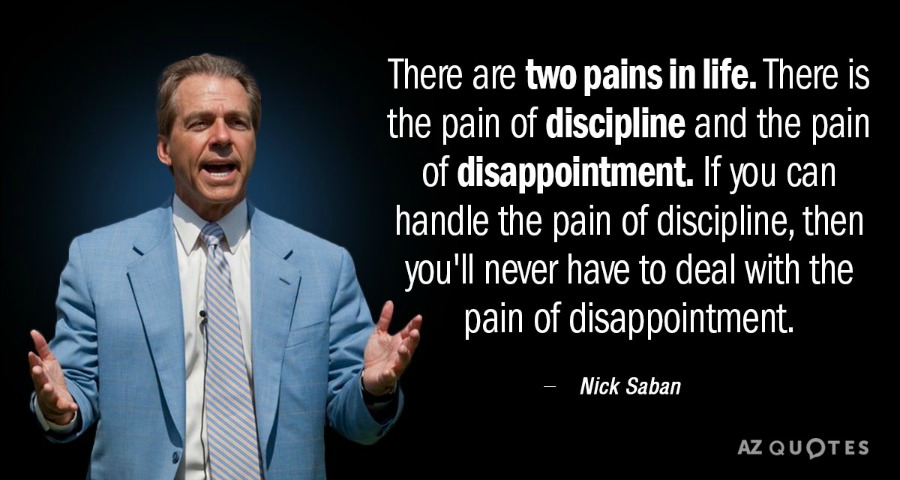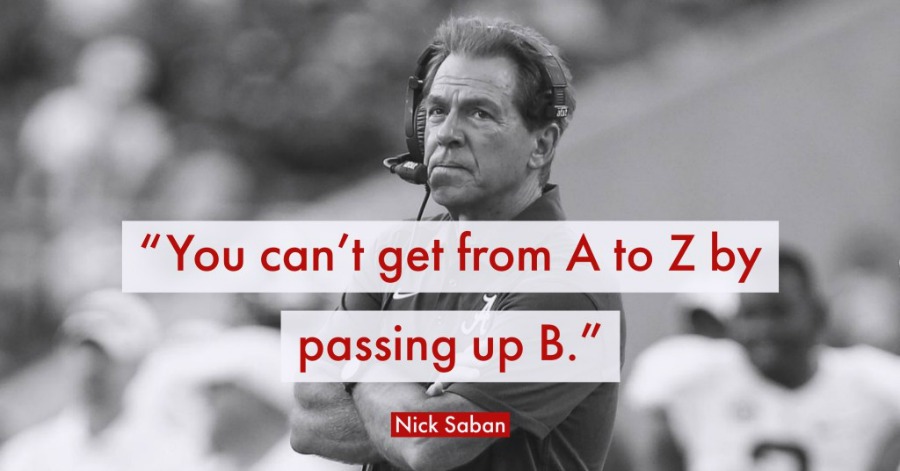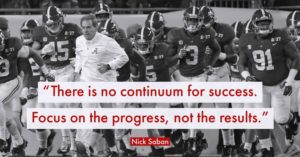Does hard work always pay off? Unfortunately not. Just ask University of Alabama Football Head Coach Nick Saban after Monday’s National Championship game versus Clemson. Saban’s Bowl Game record is 14-10. His career coaching record is 232–63–1. Talented athletes helped produce these results. But you won’t hear Saban talk much about talent. He talks mostly about process, discipline and character. It’s hard to argue with how his stats demonstrate that a rigorous process pays off over time.
In an academic setting, it’s the difference between being smart and being a good student. My heart is still aching over Alabama’s loss, so I’m dedicating this blog post to Coach Saban. I want to share a few of my favorite Coach Saban-isms and how they relate to being an effective student. For more, I highly recommend you watch the recent ESPN series Training Days: Rolling with the Tide. It’s inspiring. And frankly, it will make you want to work harder at whatever it is that truly matters to you.
Being smart can be a detriment if it leads to complacency. In my 30+-year career as an educator, athletic coach and academic coach assisting students with ACT Test Prep and College Search, I’ve encountered many smart kids who have not cultivated the habits they need to be good students. A smart kid gets by for a while on smarts. But once they start aiming for higher goals or tackling tougher subjects (sometimes not until they enter college), their lack of study skills becomes apparent.
If we’re ambitious, each one of us will eventually encounter a situation in school or life (or both), which outsmarts our smartness. At that point, process and habits can help you be a more effective student, an effective LEARNER. If you can develop those habits, then you can overcome your obstacle and achieve your full potential.
A Good Student Values The Process

Saban says, “Becoming a champion is not an easy process… It is done by focusing on what it takes to get there, and not on getting there.”
For students, this means developing a process for studying, day-in, day-out, week-in, week-out. It’s your answer to the question, “What are some of the regular practices or disciplines you follow regularly as someone who’s committed to being a good student?” Examples of developing a process might be:
- I always take notes by hand in class, and then I review my notes that same evening from that day’s class while they’re fresh in my mind.
- I always plan my study schedule for the week on Sunday nights and write it down on paper. Then I stick to it, no matter what.
- For long-term projects like papers or presentations, I start the project within a day or two of when the assignment is given instead of procrastinating. And I make my own project schedule with key deadlines I need to hit in order to complete it to the best of my ability and on time.
- I set aside an hour/day to review notes for tests that I have coming up in the next few weeks.
- I study with a friend from class at the library on Sunday afternoons from 2-4pm.
- I schedule time with my teachers on a regular basis to review those things that I’m having trouble with.
These are examples. You’ll learn what works for you and adjust your process to make it better and better over time. But when you have a process and you’re committed to following it, it lends discipline and rigor to your habits as a student.
A Good Student is Tenacious

Being tenacious also means you stick to it when the going gets rough. When the first test didn’t go according to plan, you don’t mentally prepare for a lower-than-planned semester grade. Instead, you double down on study efforts and schedule time with your teacher outside of class for extra help to achieve a better result on the second test. Maybe you ask about extra-credit opportunities or tap into a friend who rocked an A on the first test to see how they can help you study.
A Good Student Is Teachable
Being teachable first requires that you understand that you have something to learn. That requires humility and respect for your teacher or coach. I admire students who are comfortable enough in their own skin that they can admit what they don’t know or don’t do well. Those are the students I want to help and know I can help, because they’ve shown me they’re teachable. We’re all a 10 at something, and we’re all a 1 at something. Knowing yourself well enough to know what you don’t know and be willing to admit it is a strength, not a weakness. It also demonstrates a great deal of maturity.
The second key is to demonstrate that you’re teachable. Coach Saban says, “Be on time, because it shows you care.” Showing you’re teachable in an academic setting also means turning your phone off, making eye contact with the teacher, participating in class, asking questions, showing up for your teacher’s office hours to ask questions, turning your work in on time. The best news is that these things are all within your control.

How much better would your performance as a student be if you controlled the things you can control as a solid start to healthy student habits? Here are some examples:
- I always turn in my work on time
- I always show up for class on time
- I always participate in class
- I always follow up with the teacher promptly to ask questions if I have them
- I always sit in the front row, to avoid distractions and give the teacher my full attention
I can’t promise you that if you practice Having a Process, Being Tenacious and Being Teachable that you’ll skyrocket to the top of the class. But I’m confident that if you’re not already doing these things and you start doing them consistently this year, you’ll be amazed within the next 12 months how much better a student you’ll be.

For info on how OnCampus College Planning can help you become a better student and earn better scores on the ACT, schedule a free consult. We have a defined process to follow for getting better when it comes to this college planning thing.



Recent Comments